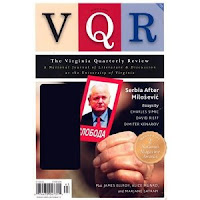A new publisher and deputy editor are joining the staff of the Virginia Quarterly Review, a news release from the University of Virginia announced Monday.
Jon Parrish Peede will take over as publisher and Donovan Webster will take on the role of deputy editor for the award-winning literary journal. The appointments come more than a year after the university completed an audit of the publication’s operations following the suicide of its managing editor, Kevin Morrissey, and subsequent allegations of workplace bullying.
“I have found the VQR work environment to be pleasant, positive and energizing,” Peede said. “There has been a great spirit of collaboration and mutual commitment to the value of the journal’s mission. We are publishing talented people who are committed to literature and long-form journalism.”
A self-inflicted gunshot wound claimed Morrissey’s life in July 2010 at the coal tower near downtown Charlottesville.
Morrissey’s friends and family accused then-VQR editor Ted Genoways of being a workplace bully toward Morrissey, who had worked at the magazine since 2003.
Two staffers resigned amid the controversy.
Peede is taking on some of the duties previously performed by Morrissey and the two staffers.
The audit was critical of Genoways’ “questionable” management style, but said the institution acted properly in its handling of the magazine’s workplace environment problems that were brought to light by the suicide.
The nine-page document noted that there were no specific allegations of bullying or harassment within the VQR prior to Morrissey’s death. It added, however, that Genoways had been reported over the years for “not being courteous or respectful with some contributors and colleagues, as well as problems with certain employees, but none ever seemed to rise to the level of a serious, on-going concern.”
Genoways’ lawyer, Lloyd Snook, issued a four-page response shortly after the audit’s 2010 release. The investigation, Snook pointed out, found no support for the widely publicized accusations that Genoways was a workplace bully.
The audit recommended “corrective action” be taken against Genoways for his management style and his level of responsiveness on administrative matters, as well as an unapproved $2,000 expenditure to subsidize the printing of his poetry.
Snook responded that the $2,000 expenditure occurred in April when Genoways asked Morrissey to make the payment from a research account maintained in the president’s office.
The audit, which cost $26,016 and was paid for by state funds, involved the examination of 23,000 e-mails, as well as financial records and interviews with 25 people, including current and former VQR staffers.
Susan Carkeek, UVa’s vice president for human resources, pledged to develop a structure within her office in which employee complaints about their supervisors could be taken, registered and followed up on.
Guiding the new structure, the report said, would be protections for employees from potential retaliation and protection for supervisors from negative consequences if complaints were determined to be unfounded or trivial.
The university also promised to create form a task force to “strengthen the institution’s policies and structures with regards to acceptable workplace conduct.”
Peede said he believes the issues brought to light by the audit have been dealt with appropriately, adding that he is “confident in [Genoways’] editorial leadership.”
“The recommendations of the university audit have been addressed, including hiring new staff members and creating a national advisory board,” he said.
In his new role, according to the release, Peede will oversee business and administrative operations of the journal, including print circulation, online and digital readership, and business development and external partnerships.
Webster will provide editorial and production management for the print publication and online content and contribute to thematic content and creative direction.
From 2007 to 2011, Peede served as director of literature grants for the National Endowment for the Arts in Washington DC. He directed more than $5 million in annual funding to the nation’s leading poets, fiction writers, translators, nonprofit presses and journals, and literary organizations.
In addition to directing the Big Read program for two years, Peede served as counselor to NEA Chairman Dana Gioia from 2003 to 2007.
Peede was the founding director of the NEA’s Operation Homecoming program, which resulted in the largest literary archive of U.S. troop writing from Iraq and Afghanistan, an acclaimed anthology and two award-winning documentaries.
He has led literary programs in Bahrain, Mexico, Northern Ireland, and other countries, the release said.
He holds a bachelor’s degree from Vanderbilt University and a master’s from the University of Mississippi.
Webster is a former senior editor for Outside magazine. He writes for National Geographic, Smithsonian, Vanity Fair and the New York Times Magazine. He is the author of several books, including “Meeting the Family: One Man’s Journey Through His Human Ancestry.”
He holds a B.A. from Kenyon College and studied in the M.F.A. program at Middlebury College, according to the release.
A magazine of current affairs, literature, history, criticism and long-form journalism, the VQR has been published continuously since 1925.
In recent years, the VQR has won six National Magazine Awards.
The VQR has also received Utne Independent Press Awards for General Excellence and International Coverage.
Issues are available on newsstands nationwide and at select independent and Barnes & Noble bookstores.
by Megan Davies


No comments:
Post a Comment